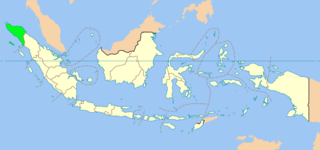 W
WThe insurgency in Aceh, officially designated the Aceh disturbance by the Indonesian government, was a conflict fought by the Free Aceh Movement (GAM) between 1976 and 2005, with the goal of making the province of Aceh independent from Indonesia. The aftermath of a strong military offensive in 2003 and the 2004 Indian Ocean earthquake brought a peace agreement and an end to the insurgency.
 W
WSince 1949, a series of occasional armed skirmishes and firefights have occurred along the Durand Line between the Afghan National Security Forces and the Pakistan Armed Forces. The latest hostilities, which are ongoing, began with the overthrow of the Taliban government.
 W
WThe Angolan Civil War was a civil war in Angola, beginning in 1975 and continuing, with interludes, until 2002. The war began immediately after Angola became independent from Portugal in November 1975. The war was a power struggle between two former anti-colonial guerrilla movements, the communist People's Movement for the Liberation of Angola (MPLA) and the anti-communist National Union for the Total Independence of Angola (UNITA). The war was used as a surrogate battleground for the Cold War by rival states such as the Soviet Union, Cuba, South Africa and the United States.
 W
WThe Arab–Iranian conflict or Arab-Persian conflict is a term which is used in reference to the modern conflict between Arab League countries and Iran. In a broader sense, the term is also used in reference to the historical ethnic tensions which have existed for centuries between Arabs and Persians as well as the historical religious sectarian conflict between Shia and Sunni Muslims, due to Saudi Arabia and post-revolutionary Iran seeing themselves as the champion leading states for Sunni Muslims and Shia Muslims, respectively. A noteworthy point in this conflict is that Iran has very positive relations with numerous Arab countries such as Iraq, Syria, Lebanon, Algeria and Tunisia. In this regard, the rivalry and tension is often seen as being between Iran and Gulf Arab monarchies, such as the GCC states and their allies: namely Egypt, Sudan, Jordan and Morocco. The biggest rivalry in the Arab–Iranian conflict is between Saudi Arabia and Iran, who have been waging a heavy proxy war against each other since the late 1970s.
 W
WThe Insurgency in Balochistan is a low-intensity insurgency waged by Baloch nationalists against the governments of Pakistan and Iran in the Balochistan region, which covers the Balochistan Province in southwestern Pakistan, Sistan and Baluchestan Province in southeastern Iran, and the Balochistan region of southern Afghanistan. Rich in natural resources like natural gas, oil, coal, copper, sulphur, fluoride and gold, this is the largest and least developed province in Pakistan. Armed groups demand greater control of the province's natural resources and political autonomy. Baloch separatists have attacked civilians from other ethnicities throughout the province. In the 2010s, attacks against the Shi'a community by sectarian groups—though not always directly related to the political struggle—have risen, contributing to tensions in Balochistan.
 W
WThe Bolivian gas conflict was a social confrontation in Bolivia reaching its peak in 2003, centering on the exploitation of the country's vast natural gas reserves. The expression can be extended to refer to the general conflict in Bolivia over the exploitation of gas resources, thus including the 2005 protests and the election of Evo Morales as president. Before these protests, Bolivia had seen a series of similar earlier protests during the Cochabamba protests of 2000, which were against the privatization of the municipal water supply.
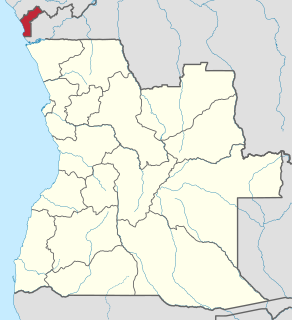 W
WThe Cabinda War is an ongoing separatist insurgency, waged by the Front for the Liberation of the Enclave of Cabinda (FLEC) against the government of Angola. FLEC aims at the restoration of the self-proclaimed Republic of Cabinda, located within the borders of the Cabinda province of Angola.
 W
WThe Casamance conflict is an ongoing low-level conflict that has been waged between the Government of Senegal and the Movement of Democratic Forces of Casamance (MFDC) since 1982. On May 1, 2014 the leader of the MFDC sued for peace and declared a unilateral ceasefire.
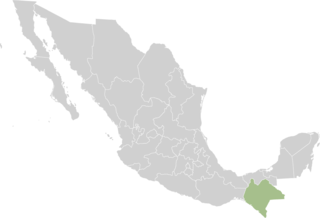 W
WThe Chiapas conflict refers to the 1994 Zapatista uprising, the 1995 Zapatista crisis and their aftermath, and tensions between the indigenous peoples and subsistence farmers in the Mexican state of Chiapas from the 1990s to the present day.
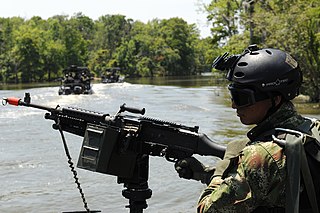 W
WThe Colombian conflict began on May 27, 1964 and is a low-intensity asymmetric war between the government of Colombia, far-right paramilitary groups, crime syndicates and far-left guerrilla groups such as the Revolutionary Armed Forces of Colombia (FARC), the National Liberation Army (ELN) and the Popular Liberation Army (EPL), fighting each other to increase their influence in Colombian territory. Some of the most important international contributors to the Colombian conflict include multinational corporations, the United States, Cuba and the drug trafficking industry.
 W
WThe current conflict in the Niger Delta first arose in the early 1990s over tensions between foreign oil corporations and a number of the Niger Delta's minority ethnic groups who feel they are being exploited, particularly the Ogoni and the Ijaw. Ethnic and political unrest continued throughout the 1990s despite the return to democracy and the election of the Obasanjo government in 1999. Struggle for oil wealth has fueled violence between ethnic groups, causing the militarization of nearly the entire region by ethnic militia groups, Nigerian military and police forces, notably the Nigerian Mobile Police. The violence has contributed to Nigeria's ongoing energy supply crisis by discouraging foreign investment in new power generation plants in the region.
 W
WThe communist rebellion in the Philippines is an ongoing conflict between the Government of the Philippines (GPH) and the New People's Army (NPA), which is the armed wing of the Marxist-Leninist-Maoist Communist Party of the Philippines (CPP). The conflict is also associated with the National Democratic Front of the Philippines (NDFP), which serves as the political wing of the CPP.
 W
WThe dissident Irish republican campaign began at the end of the Troubles, a 30-year political conflict in Northern Ireland. Since the Provisional Irish Republican Army called a ceasefire and ended its campaign in 1997, breakaway groups opposed to the ceasefire and to the peace agreements have continued a low-level armed campaign against the security forces in Northern Ireland. The main paramilitaries involved are the Real IRA, Continuity IRA and Óglaigh na hÉireann. They have targeted the Police Service of Northern Ireland (PSNI) and the British Army in gun and bomb attacks as well as with mortars and rockets. They have also carried out bombings that are meant to cause disruption. However, their campaign has not been as intensive as the Provisional IRA's, and political support for groups such as the Real IRA is "tending towards zero".
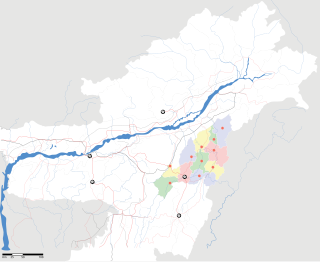 W
WThe ethnic conflict in Nagaland, in northeastern India, is an ongoing conflict fought between the ethnic Nagas and the governments of India and Myanmar. Nagaland inhabited by the Nagas is located at the tri-junction border of India on the West and South, north and Myanmar on the East.
 W
WHerdsmen attacks on unprotected villages in Nigeria have mainly involved disputes over land resources between herders and farmers across Nigeria but more devastating in the Middle Belt since the return of democracy in 1999. Often misrepresented as ethnic and/or religious conflicts, they are the result of economic, political and environmental tensions in the country. Thousands of people have died since the conflict began. Sedentary farming rural communities are often target of attacks because of their vulnerability. There are fears that this conflict would spread to other West African countries but this has often been down played by governments in the region.
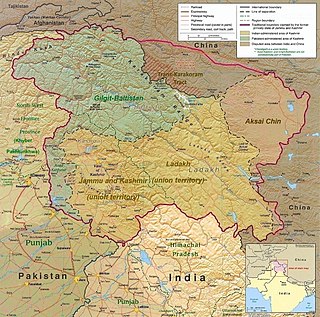 W
WThe insurgency in Jammu and Kashmir is an uprising or revolt against the Indian administration of Jammu and Kashmir, a region constituting the southern portion of the larger Kashmir region, which has been the subject of a dispute between India and Pakistan since 1947.
 W
WThe Insurgency in Arunachal Pradesh is a part of the larger Northeast India insurgency involving multiple groups trying to separate from or destabilize the province. Because of Arunachal Pradesh's close proximity to the border, many groups are able to use border crossings to promote their terrorist activity. Since Arunachal Pradesh's recapture in the 1962 War, there has been incursions from the Chinese Army in the region further escalating the conflict. The conflict has slowed since the early 2000s due to police arrest of major insurgent leaders. The highly diverse ethnic and religious population of the province has also influenced various groups.
 W
WInsurgency in Northeast India involves multiple armed separatist factions operating in India's northeastern states, which are connected to the rest of India by the Siliguri Corridor, a strip of land as narrow as 14.29 miles (23.00 km) wide. Most factions favour a separate nation while others seek regional autonomy. Some groups demand complete independence. Others wanted religious law.
 W
WThe Insurgency in Ogaden was an armed conflict that took place from 1994 to 2018. It was fought by separatists, the Ogaden National Liberation Front (ONLF), against the Ethiopian government. The war began in 1994, when the ONLF attempted to recreate Greater Somalia by unifying Ethiopia's Somali Region with Somalia. It ended in a peace agreement as part of Prime Minister Abiy Ahmed's reforms.
 W
WThe internal conflict in Myanmar is a series of insurgencies in Myanmar that began shortly after the country, then known as Burma, gained independence from the United Kingdom in 1948. The conflict has largely been ethnic-based, with several ethnic armed groups fighting Myanmar's armed forces, the Tatmadaw, for self-determination. Despite numerous ceasefires and the creation of autonomous self-administered zones in 2008, many groups continue to call for independence, increased autonomy, or the federalisation of the country. The conflict is also the world's longest ongoing civil war, having spanned more than seven decades.
 W
WThe Iran–Israel proxy conflict, also known as the Iran–Israel proxy war or Iran–Israel Cold War, is an ongoing proxy war between Iran and Israel. The conflict is bound in threats, hostility of Iran's leaders against Israel, and their declared objective to dissolve the Jewish state. Israel is concerned by Iran's nuclear weapons program, and is seeking to downgrade Iran's allies and proxies such as the Lebanese Hezbollah political-militant organization.
 W
WThe Iran–PJAK conflict is an armed conflict between the Islamic Republic of Iran and Kurdish rebels of the Kurdistan Free Life Party (PJAK), which began in 2004 and largely ended in 2011. The group carried out numerous attacks in the Kurdistan Province of Iran and provinces of Western Iran. PJAK is closely affiliated with the militant Kurdistan Workers' Party (PKK), the primary opponent of the Republic of Turkey in the Kurdish–Turkish conflict. PJAK has been designated as a terrorist organization by Iran, Japan, Turkey, and the United States.
 W
WThe Iraqi conflict is a long-running armed conflict that began with the 2003 invasion of Iraq by a United States-led coalition that toppled the government of Saddam Hussein. The conflict continued as an insurgency emerged to oppose the occupying forces and the post-invasion Iraqi government. The United States officially withdrew from the country in 2011, but became re-involved in 2014 at the head of a new coalition. The conflict is still ongoing as a low-level insurgency.
 W
WThe Kashmir conflict is a territorial conflict over the Kashmir region, primarily between India and Pakistan, with China playing a third-party role. The conflict started after the partition of India in 1947 as both India and Pakistan claimed the entirety of the former princely state of Jammu and Kashmir with Pakistan recognizing Chinese sovereignty over the Trans-Karakoram Tract and Aksai Chin since 1963. It is a dispute over the region that escalated into three wars between India and Pakistan and several other armed skirmishes. India controls approximately 55% of the land area of the region that includes Jammu, the Kashmir Valley, most of Ladakh, the Siachen Glacier and 70% of its population, Pakistan controls approximately 30% of the land area that includes Azad Kashmir and Gilgit-Baltistan while China controls the remaining 15% of the land area that includes the Aksai Chin region, the mostly uninhabited Trans-Karakoram Tract, and part of the Demchok sector. After the partition of India and a rebellion in the western districts of the state, Pakistani tribal militias invaded Kashmir, leading the Hindu ruler of Jammu and Kashmir to join India and starting the Indo-Pakistani War of 1947 which ended with a UN-mediated ceasefire along a line that was eventually named the Line of Control. After further fighting in the Indo-Pakistani War of 1965 and the Indo-Pakistani War of 1971, the Simla Agreement formally established the Line of Control between the two nations' controlled territories. In 1999, armed conflict between India and Pakistan broke out again in the Kargil War over the Kargil district.
 W
WThe Kurdish–Turkish conflict is an armed conflict between the Republic of Turkey and various Kurdish insurgent groups, which have demanded separation from Turkey to create an independent Kurdistan, or to have autonomy and greater political and cultural rights for Kurds inside the Republic of Turkey. The main rebel group is the Kurdistan Workers' Party or PKK. Although the Kurdish-Turkish conflict has spread to many regions, most of the conflict has taken place in Northern Kurdistan, which corresponds with southeastern Turkey. The PKK's presence in Iraqi Kurdistan has resulted in the Turkish Armed Forces carrying out frequent ground incursions and air and artillery strikes in the region, and its influence in Western Kurdistan has led to similar activity there. The conflict has cost the economy of Turkey an estimated $300 to 450 billion, mostly military costs. It has also affected tourism in Turkey.
 W
WOperation Linda Nchi was an operation where the Kenya Defence Forces entered southern Somalia beginning in 2011. The Kenyan government declared the operation completed in March 2012, but its forces joined AMISOM in Somalia and are not expected to leave before 2020.
 W
WThe Mexican drug war is the Mexican theater of the global war on drugs, as led by the U.S. federal government, that has resulted in an ongoing asymmetric low-intensity conflict between the Mexican government and various drug trafficking syndicates. When the Mexican military began to intervene in 2006, the government's principal goal was to reduce drug-related violence. The Mexican government has asserted that their primary focus is on dismantling the powerful drug cartels, and on preventing drug trafficking demand along with the U.S. functionaries.
 W
WThe Nepalese Civil War was an armed conflict in Nepal fought between the Communist Party of Nepal (Maoist) (CPN-M) and the Government of Nepal from 1996 to 2006. The conflict period is known as the Saśastra Dvandvakāla in Nepal.
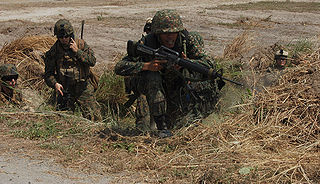 W
WOperation Enduring Freedom – Philippines (OEF-P) or Operation Freedom Eagle was part of Operation Enduring Freedom and the global War on Terror. The Operation targeted the various Jihadist terror groups operating in the country. By 2009, about 600 U.S. military personnel were advising and assisting the Armed Forces of the Philippines (AFP) in the Southern Philippines. In addition, by 2014, the CIA had sent its elite paramilitary officers from their Special Activities Division to hunt down and kill or capture key terrorist leaders. This group had the most success in combating and capturing Al-Qaeda leaders and the leaders of associated groups like Abu Sayyaf.
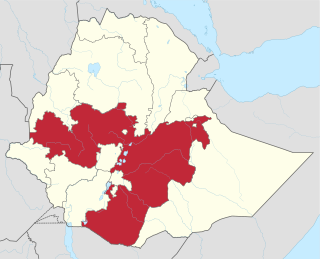 W
WThe Oromo conflict is a longstanding conflict between Oromo separatists and the Government of Ethiopia. The OLF originally fought the Ethiopian Empire to liberate Oromo people and establish an independent Oromia state. The conflict began in 1973, when Oromo nationalists established the OLF and its armed wing, the Oromo Liberation Army (OLA).
 W
WThe Papua conflict is an ongoing conflict in Western New Guinea between Indonesia and the Free Papua Movement. Subsequent to the withdrawal of the Dutch administration from the Netherlands New Guinea in 1962 and implementation of Indonesian administration in 1963, the Free Papua Movement has conducted a low-intensity guerrilla war against Indonesia through the targeting of its military and police.
 W
WThe Sri Lankan Civil War was a civil war fought in the island country of Sri Lanka from 1983 to 2009. Beginning on 23 July 1983, there was an intermittent insurgency against the government by the Velupillai Prabhakaran led Liberation Tigers of Tamil Eelam, which fought to create an independent Tamil state called Tamil Eelam in the north and the east of the island due to the continuous discrimination against the Sri Lankan Tamils by the Sinhalese dominated Sri Lankan Government, as well as the 1956, 1958 and 1977 anti-Tamil pogroms and the 1981 burning of the Jaffna Public Library carried out by the majority Sinhalese mobs, in the years following Sri Lanka's independence from Britain in 1948. After a 26-year military campaign, the Sri Lankan military defeated the Tamil Tigers in May 2009, bringing the civil war to an end.
 W
WTitan Rain was a series of coordinated attacks on computer systems in the United States since 2003; they were known to have been ongoing for at least three years. The attacks originated in Guangdong, China. The activity is believed to be associated with a state-sponsored advanced persistent threat. It was given the designation Titan Rain by the federal government of the United States.
 W
WThe War on terror, also known as the Global War on Terrorism and U.S. War on Terror, is an international military campaign launched by the United States government after the September 11 attacks. The targets of the campaign are primarily Sunni Islamic fundamentalist armed groups located throughout the Muslim world, with the most prominent groups being Al-Qaeda, the Islamic State, the Taliban, Tehrik-i-Taliban Pakistan, and the various franchise groups of the former two organizations. The naming of the campaign uses a metaphor of war to refer to a variety of actions that do not constitute a specific war as traditionally defined. U.S. president George W. Bush first used the term "war on terrorism" on 16 September 2001, and then "war on terror" a few days later in a formal speech to Congress. In the latter speech, George Bush stated, "Our enemy is a radical network of terrorists and every government that supports them." The term was originally used with a particular focus on countries associated with al-Qaeda. The term was immediately criticised by such people as Richard B. Myers, chairman of the Joint Chiefs of Staff, and more nuanced terms subsequently came to be used by the Bush administration to publicly define the international campaign led by the U.S. While it was never used as a formal designation of U.S. operations in internal government documentation, a Global War on Terrorism Service Medal was issued.
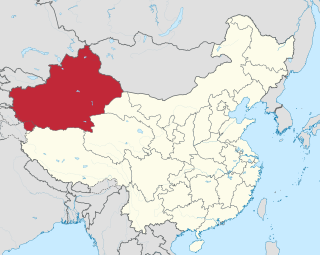 W
WThe Xinjiang conflict, also known as Uyghur–Chinese conflict, is a conflict in China's far-northwest autonomous region of Xinjiang centred on the Uyghurs, a Turkic minority ethnic group who make up the largest group in the region.